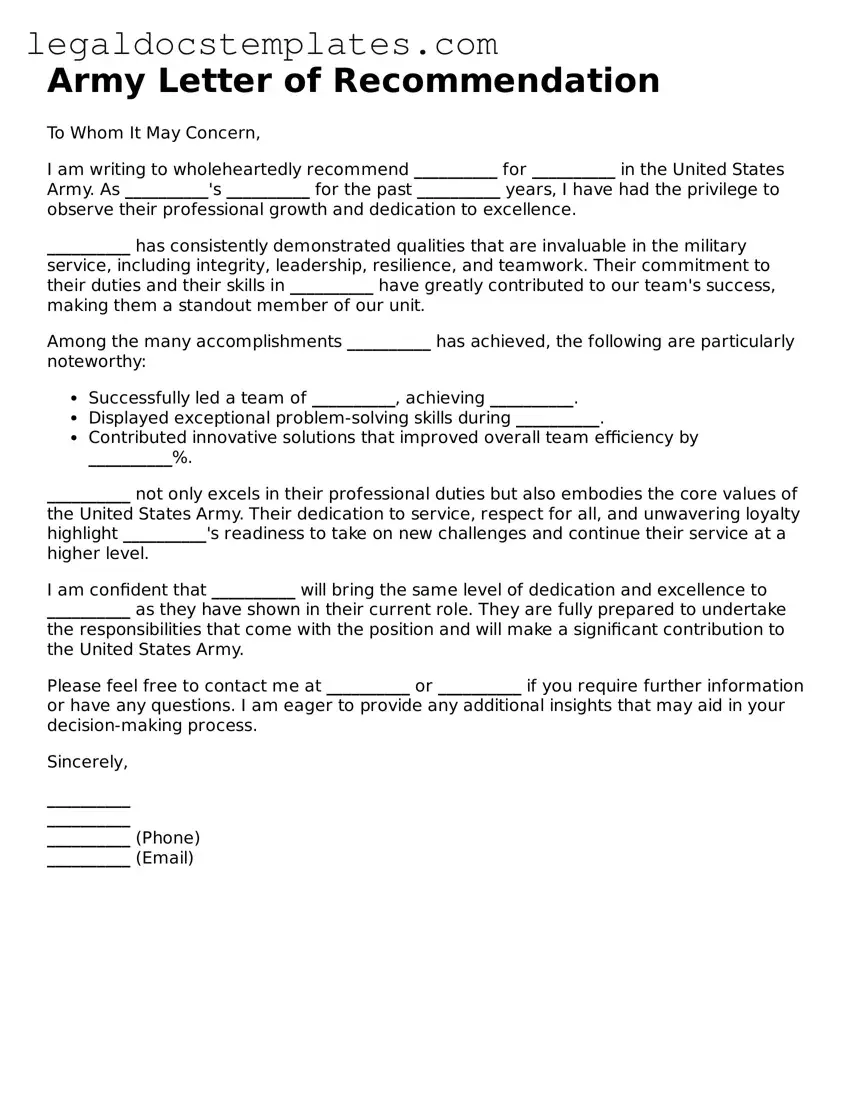The Army Letter of Recommendation form shares similarities with the Navy Letter of Commendation in that both are military documents used to acknowledge the exemplary service of personnel within their respective branches. These documents celebrate achievements, valor, or distinguished service, often contributing to the individual's career progression by supporting promotions or special assignments. The context within which these accolades are awarded highlights the shared value of exceptional performance across military branches.
Similarly, the Letter of Recommendation for a Job Position echoes the purpose of the Army Letter of Recommendation by offering a formal endorsement of an individual's skills, performance, and suitability for a new role or responsibility. Though one document is used within the military and the other in civilian employment, both are critical in supporting career advancement by providing an authoritative perspective on an individual's capabilities and achievements.
The Academic Letter of Recommendation is akin to the Army Letter of Recommendation as both serve to endorse individuals, albeit in different arenas. Where the Army Letter supports career progression within the military, the academic letter plays a pivotal role in the pursuit of educational opportunities or academic honors. Despite the differing contexts, the core intent to formally commend and support the individual's aspirations remains constant.
The Professional License Recommendation Letter shares its goal with the Army Letter of Recommendation by aiming to vouch for an individual's qualifications and character in a professional setting. Whether seeking a licensure crucial for a specific line of work or a commendation for military service, these letters are foundationally about endorsing the expertise and integrity of the individual in question, underpinning their suitability for certain recognitions or professional advancements.
The Character Reference Letter, often used in legal or personal contexts, has a parallel function to the Army Letter of Recommendation, despite their different applications. Both types of letters aim to paint a positive and compelling portrait of an individual, focusing on character virtues, ethical conduct, and personal achievements, which can be influential in settings ranging from courtrooms to military promotion panels.
The Scholarship Application Letter of Recommendation is another document that, while used in an educational context, shares similarities with the Army Letter of Recommendation by striving to bolster an individual's case for receiving a scholarship through endorsements of their character, accomplishments, and potential. Just as the Army Letter advocates for military personnel, the scholarship letter supports students, underlining the universal importance of external validation in achieving personal goals.
The Immigration Letter of Recommendation steps into the legal domain, offering a testimonial to support an individual's application for visas, residency, or citizenship. Its essence is similar to the Army Letter of Recommendation in that it seeks to positively influence the recipient's decision-making process by detailing the commendable qualities and contributions of the person in question, thereby assisting them in reaching a significant life milestone.
Finally, the Peace Corps Letter of Recommendation, while specifically targeting individuals seeking to serve in this global volunteer program, parallels the Army Letter of Recommendation in its function to endorse the applicant's suitability and readiness for the challenges ahead. Both documents underline the significance of character, skills, and commitment to service, highlighting the individual's preparedness for undertaking important roles, whether in a military or civilian capacity of service.

